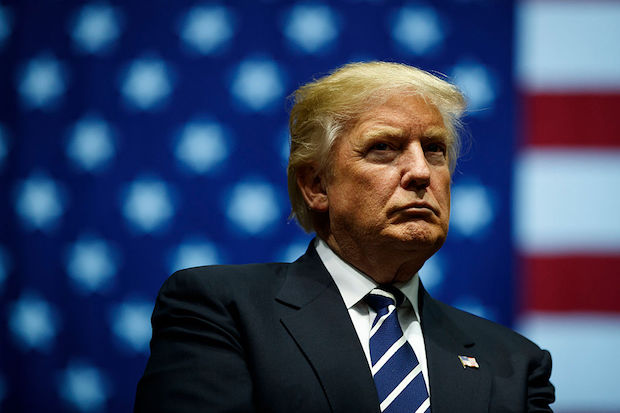This is the leading article from this week’s issue of The Spectator – out tomorrow.
Donald Trump has often wrong-footed the media. In last year’s election his campaign seemed to be always on the verge of falling apart, but it didn’t. Candidate Trump was endlessly engulfed by crisis. The media said he could not win, but he did.
It’s tempting to think that the Trump presidency fits the same pattern; that all the chaos in the White House, reports of the horrifying incompetence of his administration and his dangerously erratic behaviour are exaggerated: fake news, as he would say. But it doesn’t. Just four months in, the Trump presidency is starting to look unviable.
Trump’s greatest problem is himself. He seems determined to plunge into scandal. The allegations against him are grave and mounting. In the last few days, it has emerged that he spilled classified ‘codeword’ intelligence to the Russian government just to show off; that he urged FBI director James Comey to abandon an investigation against former national security adviser Mike Flynn because Flynn is a ‘good guy’; and that he fired Comey for not helping him cover up his links to Russia.
Even if none of these is as bad as it first seems, and looking past the undeniable media bias against him, we can see a presidency out of control. The sheer volume of outrage and the level of briefing against him shows disintegration in his own team. At best, this is an administration that is very good at pretending that it has no idea what it is doing. At worst, it is already completely dysfunctional.
Well past his first 100 days, many key government departments have not been properly staffed. The State Department is being called a ‘ghost ship’. The White House seems riddled with animosities and warring factions, overseen by a president unable and unwilling to admit that anything might be wrong, a president who still takes to Twitter almost daily to vent his spleen. Last week he tweeted that ‘James Comey better hope that there are no “tapes” of our conversations before he starts leaking to the press!’ — a strange threat that appeared to have backfired, given that the next week a Comey memo did emerge suggesting that Trump had tried to make the FBI drop the Flynn investigation.
The most striking aspect of the revelations about Trump giving away state secrets is that the leak appears to have come from a source hitherto loyal to him; one who was appalled by the president’s mental incontinence and considered his indiscretion a threat to national security. If even the Trumpists are turning against him, how long can he survive?
This isn’t just Washington intrigue, either. There is Trump’s basic lack of popularity, which undermines his supposed role as man of the people against the elite. His job approval rating is at 40 per cent, a historic low for a new president. And his popularity is now starting to dip among the Republicans who supported him: even his more ardent supporters are starting to believe that he is unfit for office.
Trump came to the presidency promising to Make America Great Again from the off, but he failed to pass any of the major pieces of legislation he promised. His visa ban was ill-prepared and stopped by the courts. His American Healthcare Act has passed Congress, but it is extremely unpopular and will almost certainly be picked apart in the Senate. He had to abort his plan to announce an abrupt cessation of the North American Free Trade Agreement to mark his first 100 days in office, after being persuaded that it would have resulted in chaos. And then there is his apparent determination to carry on acting as CEO of the Trump Organisation, despite his insistence that he has left his businesses behind — he has visited Trump-branded properties on 36 of his first 116 days.
So what can be done? Impeachment still looks unlikely, but the American public is growing weary of Trump’s lack of seriousness and failure to achieve. In Washington, a growing body of opinion insists that the president could be removed from the office under the 25th amendment to the US Constitution, which requires a majority of his cabinet to tell Congress that the president is ‘unable to discharge the powers and duties of his office.’ Congress would then have to confirm this by a two-thirds majority vote. If they wanted to demonstrate incompetence, there is all too much evidence to make this case.
But Trump’s detractors can easily get carried away with the idea of deposing him. There is no evidence that his cabinet is ready to turn on him; it’s mostly whispers in the corridors of power, repeated eagerly by a hostile press. Trump’s tour of Saudi Arabia, Israel and the Vatican might boost his image as a global statesman worth reckoning with, thanks in large part to the low expectations he has set. He can also point to some successes: a dramatic fall in illegal border crossings (despite the lack of a wall), the appointment of Neil Gorsuch to the Supreme Court, and the booming US economy. All the brouhaha about his shady links to Russia and his corruption can still be passed off as tittle-tattle. The Trump presidency is not finished, but it is in deep crisis. Unless he can quickly correct the image of himself as a reckless charlatan who is unworthy to lead the free world, he will not see out his first term.






Comments